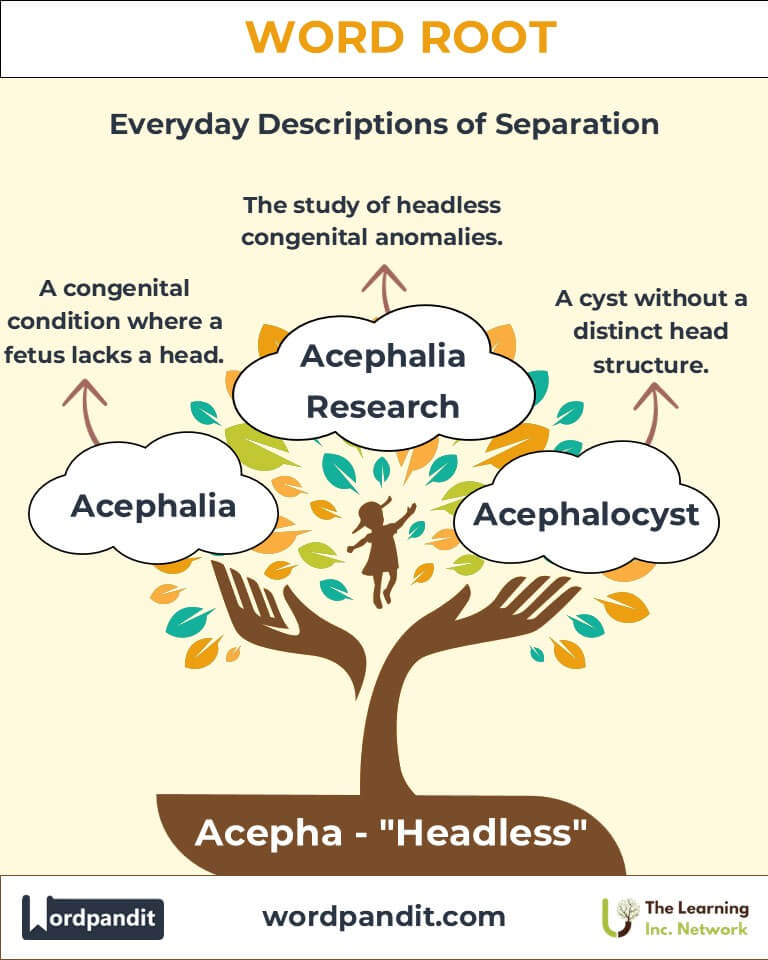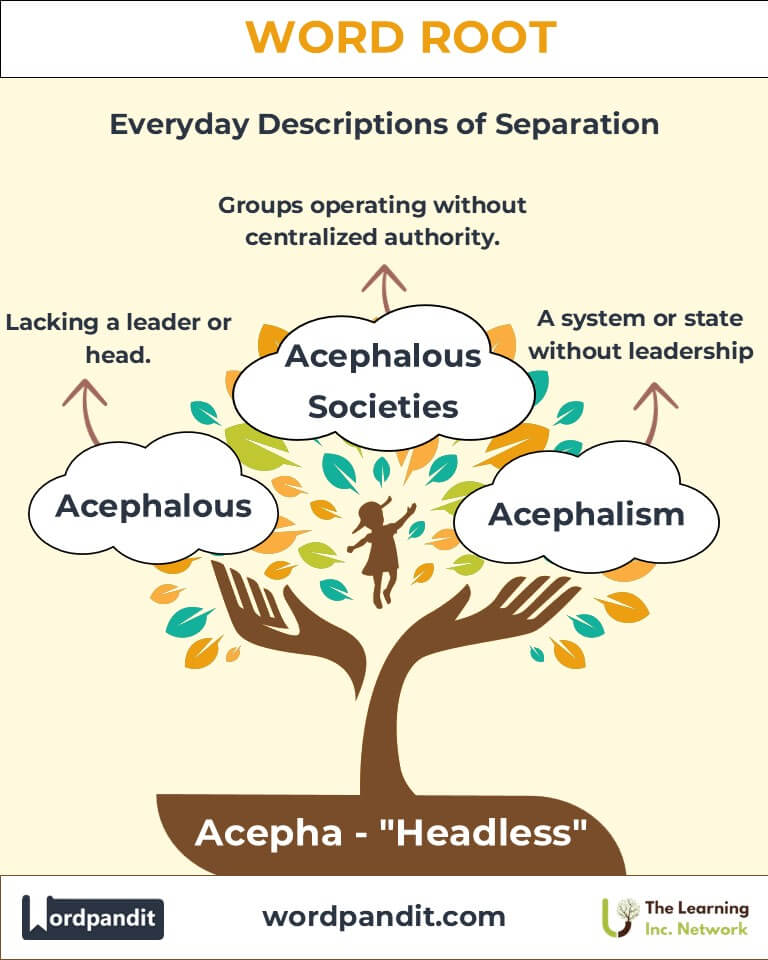Acepha: Exploring the Fascinating Root of "Headlessness"
Discover the intriguing world of the word root "Acepha," meaning "headless." This root, derived from Greek origins, illuminates words like "acephalous" and "acephalia," encapsulating concepts of structure, absence, and formation. Dive deep into its etymology, usage, and relevance across disciplines.

Table of Contents
- Introduction: Understanding "Acepha"
- Etymology and Historical Journey
- Mnemonic: Remembering "Acepha"
- Common Acepha-Related Terms
- Acepha Through Time
- Acepha in Specialized Fields
- Illustrative Story: Acepha in Action
- Cultural Significance of the Acepha Root
- The Acepha Family Tree
- FAQs about the Acepha Word Root
- Test Your Knowledge: Acepha Word Root Quiz
- Conclusion: The Legacy of Acepha
1. Introduction: Understanding "Acepha"
What do ancient governance and medical conditions have in common? The answer lies in the Greek root "Acepha" (pronounced ah-SEF-ah), meaning "headless." This root often signifies the absence of a central authority, leader, or structure and has applications ranging from political terminology to biological descriptions.

2. Etymology and Historical Journey
"Acepha" stems from the Greek prefix a- (without) and kephalē (head). Historically, it described entities or organisms lacking a leader or physical head. Ancient philosophers used "acephalous" metaphorically for leaderless groups, while anatomists employed it to identify certain congenital conditions. The root entered English through medieval Latin during the Renaissance, enriching both political and scientific lexicons.
3. Mnemonic: Remembering "Acepha"
Picture a headless statue representing the root "Acepha." To anchor the meaning, imagine the phrase:
Mnemonic Device: "Acepha—absence of a head, authority, or central figure."
4. Common Acepha-Related Terms
- Acephalous (ah-SEF-uh-luhs):
- Definition: Without a leader or head.
- Example: "The revolution resulted in an acephalous government struggling to maintain order."
- Acephalia (ah-SEF-uh-lee-uh):
- Definition: A congenital condition where a fetus lacks a head.
- Example: "Rare cases of acephalia provide insight into developmental biology."
- Acephalocyst (ah-SEF-uh-loh-sist):
- Definition: A cyst without a distinct head structure.
- Example: "Medical imaging revealed an acephalocyst in the patient’s abdomen."
- Acephalism (ah-SEF-uh-liz-um):
- Definition: A state or system without leadership.
- Example: "Acephalism was evident in the decentralized committee structure."
5. Acepha Through Time
- Acephalous Societies: Ancient anthropologists used this term for groups operating without centralized authority, such as certain tribal communities.
- Medical Advances: The study of acephalia advanced in the 19th century, shedding light on embryonic development and genetic anomalies.
6. Acepha in Specialized Fields
- Biology and Medicine:
- Terms like "acephalia" focus on congenital anomalies, providing insight into developmental processes.
- Relevance: Advances in understanding these conditions contribute to prenatal care and genetic research.
- Political Science:
- "Acephalous" describes leaderless movements or organizations.
- Example: Grassroots initiatives often adopt an acephalous structure to empower collective decision-making.
- Literature:
- "Acephalous lines" refer to poetic verses missing their initial syllable or stressed beat.
- Example: An acephalous iambic line often creates dramatic emphasis in poetry.
7. Illustrative Story: Acepha in Action
In a bustling metropolis, a grassroots organization formed to address housing issues. Operating acephalously, the group thrived on collective decisions. Despite initial skepticism, their structure fostered innovation, proving that headless systems could still lead to impactful change. Simultaneously, medical researchers studying acephalia unveiled new techniques to detect developmental anomalies earlier, exemplifying how the root "Acepha" spans disciplines to influence lives.
8. Cultural Significance of the Acepha Root
The concept of "Acepha" resonates in society's exploration of governance and structure. From leaderless revolutions to poetic creativity, the root challenges traditional notions of hierarchy and completeness. It underscores humanity's capacity to adapt, even in the absence of a head or leader.

9. The Acepha Family Tree
- Kephal (Greek: head):
- Examples: Cephalopod: Marine animals like octopuses, known for prominent heads; Cephalalgia: Headache.
- A- (Greek: without):
- Examples: Atypical: Not typical; Asymmetric: Lacking symmetry.

10. FAQs About " Acepha "
Q: What does the word root "Acepha" mean?
A: "Acepha" is a Greek root meaning "headless." It is often used in contexts to describe a lack of a central head, leader, or authority in political, biological, or metaphorical terms.
Q: What is an acephalous organization?
A: An acephalous organization refers to a group or system without centralized leadership or authority. These organizations often rely on collective decision-making and can be found in grassroots movements or some tribal communities.
Q: What does "acephalia" describe in medicine?
A: Acephalia is a rare congenital condition where a fetus develops without a head. It is a severe form of developmental anomaly, often used in medical and embryological studies to understand developmental processes.
Q: How is "Acepha" relevant in literature?
A: In poetry, an acephalous line refers to a verse that begins without its expected first syllable or stressed beat, creating a stylistic effect. This technique is used to emphasize particular parts of the text or to create a rhythmic variation.
Q: What is the significance of acephalism in political science?
A: Acephalism describes a lack of hierarchical or centralized authority within a system. It is significant in studying decentralized governance models, such as anarchism, or certain historical tribal societies.
11. Test Your Knowledge: " Acepha " Mastery Quiz
1. What does the root "Acepha" signify?
2. Which field commonly uses the term "acephalia"?
3. What does an acephalous society lack?
4. What is an acephalous line in poetry?
5. What does "acephalism" describe in political systems?
12. Conclusion: The Legacy of Acepha
The root "Acepha" transcends its literal meaning of "headless," offering profound insights into absence, structure, and formation. Whether in political theory, medical research, or literary analysis, it challenges our understanding of what it means to lack a head or leader. As humanity continues to explore decentralized systems and complex developmental phenomena, "Acepha" remains a vital lens through which to view innovation and resilience.














